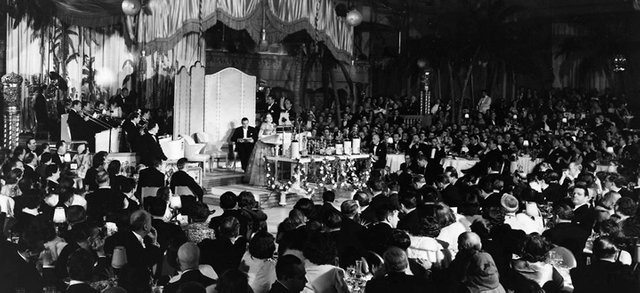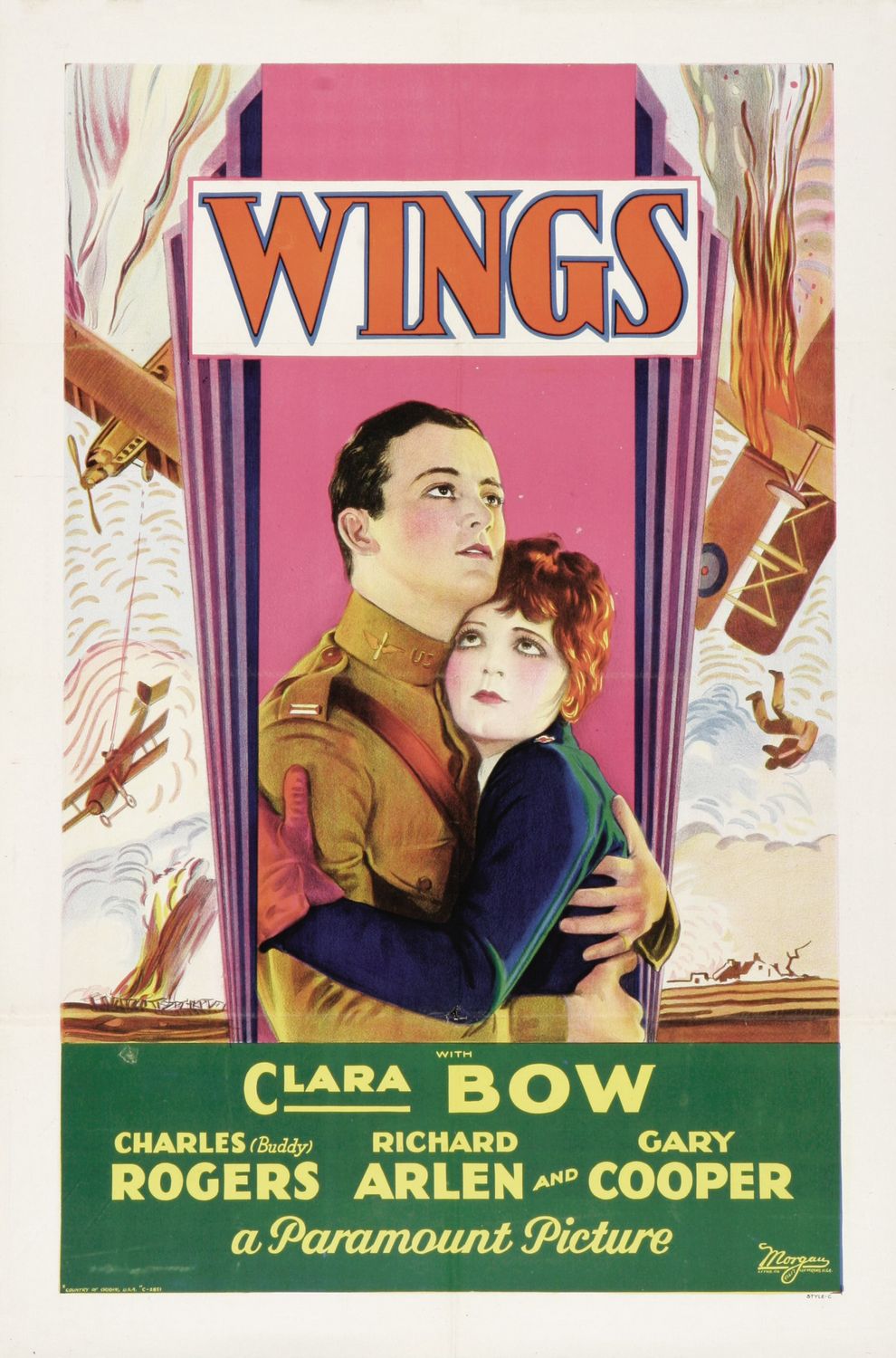Hello Steemians,
Since I am a huge Oscars fan and I closely follow this annual review of the best film achievements, I decided to open a series of blogs in which I will write about the history of the Oscars and the best film achievements since 1929 when the first Oscar awards took place, up until now. I will make sure that in this and all the following blogs, I really give my opinion about every film that has received this prestigious award, to mention those who did not get it but maybe deserved it, there will be many interesting facts, a little statistics, intrigues, and all the rest that everyone we love to be informed about this unique event when film art is in question. Also, each blog will be an analysis of the annual award from the first to the present, through a review of the best film that won the prize that year. I hope it will be interesting for you to follow and read.

Personally, I adore the Oscars, every year before the award, I am constantly informed about all the nominations, I look at almost all the films, I enjoy guessing who will take away a small golden statue of 34 cm that year, and who will go empty handed, who will cry, who will laugh, which music will be the best. Staying until late at night does not pose a problem because I would not miss this once a year experience for anything in the world. The day after the Oscars are awarded, I must read all the news articles on this subject, and I adore both the criticism of the gala gauns of the famous actresses and the film achievements that took the rewards. All in all, I am a great fan of the Oscars, I am very excited beforeevery event and I hope that I will succeed in bringing this excitement to you in this series of blogs . So let us begin.
What is an Oscar and who awards it?
Oscar is an official Academy Award nominee, an annual film award given by the American Academy of Motion Picture Arts and Sciences. To many people in the world, as to myself, Oscar is but a different association. We think of glamur, glow, solemnity, excellent film achievements, beautiful toilets and success. And indeed every director, actor, actress, costume designer, set designer who succeeds in winning this golden statue can proudly say that he has achieved the absolute success in their line of work. Everyone from the film world is dreaming of holding this prestigieous statue in their hands and keeping it as the greatest treasure and proudly showing everyone. In addition, the proud owner will forever become immortal in the art world, their names will be dressed and always remembered when it comes to the history of the Oscars. Sweet success, you will agree with me.
The Academy Award for Excellence is awarded by the Academy of Film Arts and Sciences, a non-profit, professional, honorary organization devoted to the development of film art and science, founded in California on May 11, 1927. In 2003, the Academy had 5 816 members, among which actors, with 1 311 members, constituted the most convincingly largest voting block. Membership in the Academy is achieved by being named and submitted for consideration by someone who is already a member of the Academy. If a proposal is adopted, an official invitation for joining is sent. The Academy does not publish members names, although the names of those who are invited to join are being revealed recently. If a person is nominated for more than one category within one year, he or she must decide on which branch of the Academy to join if membership is accepted.
Members of the various branches of the Academy nominate Oscar nominees from their fields (actors nominate actors, etc.), while all members of the Academy can nominate candidates for the best film category. The winners are then determined in the second round of voting in which all members are allowed to vote in all categories.
According to Rules 2 and 3 of the Academy's official regulations, the candidate film had to have a Los Angeles premiere during the previous calendar year (from midnight on January 1 to midnight on December 31) and must last for at least 40 minutes (except in the case short film category).
Appearance and the name of the statue
The artistic director of Metro Goldwyn Mayer, Cedric Gibbons, one of the first members of the Academy, is credited with designing the Oscars. Gibbons' design in clay was modeled by scout George Stanley. The scar is 34 cm tall and weighs 3.85 kg and represents the knight who stands on the roll of the film holding the Crusader sword. The five small rolls on the roll of the film symbolize the five original branches of the Academy: actors, screenwriters, directors, producers and technicians. Until 1949, statuettes did not carry serial numbers. Since that year, starting with an arbitrarily taken number 501, each statue carries its serial number engraved on the back. The first 15 statues awarded at the original awards ceremony were made of gilded bronze, but the bronze was soon abandoned. A rather interesting piece of information, right? Since 1950, legislation has been in force that does not allow the winners and their successors to sell the statuettes without first offering them for purchase to the Academy at a price of one dollar. If the winner refuses to accept this rule, then the Academy retains the title. Of course, this rule would not be interesting if there weren’t two exceptions and all intrigues that were related to them. The Oscar Marlon Brando won in 1954 for the best male role in ‘’On The Waterfront’’ somehow escaped this regulation and was sold at one auction in 1988 for $ 13,500. A few years ago, the Oscar, which Vivien Leigh got for the role in the legendary ‘’Gone With the Wind’’ was sold for $ 563,000. Up until today, it is not known how.
Name Oscar?
Imagine another intrigue and a million dollar question. In her autobiography, Bette Davis claimed to have named the Academy Award Oscar after her husband Harmon Oscar Nelson. However, the most popular theory of the origin of the prize name says that some Margaret Herrick, who was once Executive Secretary of the Academy, commented on how the statue resembled her uncle Oscar when she first saw it in 1931. Journalist Sidney Skolsky wrote in an article that Academy Award employees between themselves call by the name Oscar. He also used this name after the sixth consecutive Oscars, commenting on the award for the best female role assigned to Katharine Hepburn. The Academy itself officially adopted this nickname in 1939. But the origin of the name of this beautiful statue is still not known, and leaves a lot of space for speculations and legendary stories. Do you perhaps know asome stories to hare here with us? I would be thrilled to hear a new theory.
The first ceremony of Oscar 1929.

Source: http://patrickmurfin.blogspot.com/2016/05/first-academy-awards5-ticket-and-didnt.html
We all know how the ceremony looks like today - the names of the nominees are announced earlier, there are countless categories, you can find out winners in live program, and you can watch the transmission of a many hours spectacle on TV or over the Internet. However, in 1929, everything looked completely different.
The first Oscar ceremony was held in 1929 during a dinner at the Hollywood Roosevelt Hotel - just across the street where the ceremony is held today. There were only 270 guests present and the price of the ticket was five dollars. This is the first and also the last Oscar award that did not have the transmission over mass media. A very interesting fact, although today it is almost impossible to imagine such thing.
The first film, which was named best, was Wings, in which the lead role was played by Clara Bow. It's also the only silent film that won the Oscar until 2011 and the movie ''the Artist'', but about this film on some other occasion.

Source: http://www.impawards.com/1927/wings.html
Aside from industry officials, the ordinary people could buy a ticket, at a price of then five dollars, which in today money would be just under 65 euro.
There was no surprise at the ceremony, as the winners' names were announced three months before the event! There were only 12 categories, and it's interesting that some were overlapping - "Unique Artistic Film" and "Outstanding Film" were considered equally the main awards of the evening. Also, it was allowed to be awarded multiple times in the same category, so the main actor and actress won awards for several films.
The entire event, hosted by the president of the American Film Academy Douglas Ferbanks, lasted about 15 minutes!
The first ceremony was also the last one on which they were shown only silent films.
The ceremony was not even the fashion extravaganza that it later became. Oscar winner for the best female role, then 22-year-old Janet Gainor, came out on the stage to receive the award in a modest, trendy dress she bought a few days earlier. She received the prize for the roles in all three films for which she was nominated: "Seventh Heaven", "Street Angel" and "Dawn".
German actor Emil Janings won the Academy Award for best actor for his roles in "The Last Command" and "The Fate of Each Way". After proclaiming him as the "state artist" in 1941 by the nazzie minister of the propaganda Josef Gebels, Hollywood tried to hush this "unpleasant" episode.
At the first ceremony, the great Charlie Chaplin was awarded the first honorary Oscar, the one stolen this year in Paris, and the value on the market was estimated at over a million of dollars.
Originally nominated for the best actor, best scriptwriter and best comedy director, Chaplin was withdrawn from these categories so that special awards (for artistic diversity and ingenuity in writing, acting and production) were handed over. Many attributed this decision to his unpopularity in Hollywood.
It's almost impossible for me to imagine how this first Oscars award ceremony looked like. Can You?
I hope you liked the first blog in the series about the history of the Oscar. Soon I will writte another text, hope you will enjoy it like myself.
